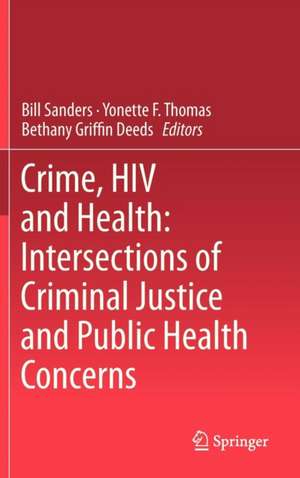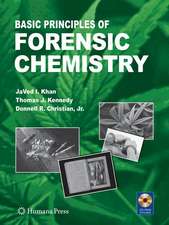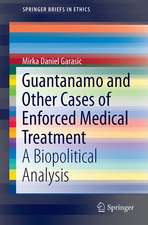Crime, HIV and Health: Intersections of Criminal Justice and Public Health Concerns
Editat de Bill Sanders, Yonette F. Thomas, Bethany Griffin Deedsen Limba Engleză Hardback – 12 sep 2012
As well as exploring these urgent issues, this anthology features a wealth of remarkable interdisciplinary contributions that see public health researchers focusing on crime, while criminologists attend to public health issues. The papers provide empirical data tracking, for example, the repercussions on public health of a fear of crime among residents of high-crime neighborhoods, and the correlations between HIV status and outcomes, and an individual’s history of criminal activity. Providing social scientists and policy makers with vital pointers on how the criminal justice and public health sectors might work together on the problems common to both, this collection breaks new ground by combining the varying perspectives of a number of key disciplines.
| Toate formatele și edițiile | Preț | Express |
|---|---|---|
| Paperback (1) | 946.41 lei 6-8 săpt. | |
| SPRINGER NETHERLANDS – 15 oct 2014 | 946.41 lei 6-8 săpt. | |
| Hardback (1) | 952.40 lei 6-8 săpt. | |
| SPRINGER NETHERLANDS – 12 sep 2012 | 952.40 lei 6-8 săpt. |
Preț: 952.40 lei
Preț vechi: 1161.47 lei
-18% Nou
Puncte Express: 1429
Preț estimativ în valută:
182.24€ • 188.01$ • 152.08£
182.24€ • 188.01$ • 152.08£
Carte tipărită la comandă
Livrare economică 26 martie-09 aprilie
Preluare comenzi: 021 569.72.76
Specificații
ISBN-13: 9789048189205
ISBN-10: 9048189209
Pagini: 336
Ilustrații: XXXVI, 300 p.
Dimensiuni: 155 x 235 x 25 mm
Greutate: 0.64 kg
Ediția:2013
Editura: SPRINGER NETHERLANDS
Colecția Springer
Locul publicării:Dordrecht, Netherlands
ISBN-10: 9048189209
Pagini: 336
Ilustrații: XXXVI, 300 p.
Dimensiuni: 155 x 235 x 25 mm
Greutate: 0.64 kg
Ediția:2013
Editura: SPRINGER NETHERLANDS
Colecția Springer
Locul publicării:Dordrecht, Netherlands
Public țintă
Professional/practitionerCuprins
1) Linda Teplin & co.: Northwestern: Incarcerated juveniles, mental health and co-morbidity.-2) Dan O'Connell, Jim Inciardi & co.: University of Maryland: HIV status, related outcomes, and criminal justice history.-3) Carolina Guzman & Barry Krisberg: National Council on Crime and Delinquency: Findings from the Health Returns Initiative - Physical and mental health of juvenile during and after incarceration.-B) Health consequences of risk behaviors.-4) Bill Sanders, Geoffrey Hunt, & Avelardo Valdez & co.: Cal. State LA, Institute for Scientific Analysis, University of Texas, San Antonio: Gang youth, risk behaviors and negative health outcomes.-5) Patricia Case, M. Gallardo-Cruz, Robin A. Pollini, I. Artamonova, A. Vera, Stephanie A. Strathdee. UC Sand Diego, Pandillas y Salud: Correlates of Gang Membership among Injection Drug Users (IDUs) in Tijuana, Mexico. [Note: Pandillas y salud = gangs & health].-6) Debbie Baskin, Ira Sommers, & Arielle Baskin-Sommers: Cal. State LA; University of Wisconsin, Madison: Health consequences of crystal methamphetamine and other drug use.-C) Public health interventions with high risk populations.-7) Leslie Clark & co. Division of Adolescent Medicine, Children's Hospital Los Angeles: Project AIM (Adult Identity Monitoring): An appraisal of Project Aim's preliminary results with high risk youth.-8) Tanya Nieri, J.L. Matjasko, K. Williams and N. Guerra: Center for Disease Control, Academic Center for Excellence, University of California, Riverside: Youth violence prevention: Public health intervention and high risk populations.-D) Crime, Space and Health.-9) Paul Grunewald & co.: Pacific Institute for Research and Evaluation: A spatial analysis of drug markets and violence over time.-10) Christopher R. Browning & Kathleen A. Cagney; The Ohio State University, University of Chicago. The Socio spatial Context of Cardiovascular Risk: Neighborhood Crime, SocialCohesion, and Blood Pressure.
Recenzii
Crime, HIV and Health: Intersections of Criminal Justice and Public Health Concerns is a very welcome addition to the literature. Edited by Bill Sanders, Yonette Thomas and Bethany Deeds, the volume examines the nodes where public health and criminal justice meet. By focusing on drug use, risky sexual behavior, HIV, violence, and delinquency, the chapters in this book illustrate the convergences and divergences between the two perspectives. It is clear that criminal justice has a good deal to learn from public health, and public health in turn can benefit from paying attention to research and practice in criminal justice. The Sanders, Thomas and Deeds volume goes a long way toward defining the way that these two perspectives can work together. This book is required reading for all who want an understanding of how public health and criminal justice can be successfully integrated and form the basis for a successful response to the most pressing social issues of our time.
Scott H. Decker, Foundation Professor and Director of the School of Criminology and Criminal Justice at Arizona State University.
Scott H. Decker, Foundation Professor and Director of the School of Criminology and Criminal Justice at Arizona State University.
Textul de pe ultima copertă
Carefully selected to reflect the latest research at the interface between public health and criminal justice in the US, these contributions each focus on an aspect of the relationship. How, for example, might a person’s criminal activity adversely affect their health or their risk of exposure to HIV infection? The issues addressed in this volume are at the heart of policy in both public health and criminal justice. The authors track a four-fold connection between the two fields, exploring the mental and physical health of incarcerated populations; the health consequences of crime, substance abuse, violence and risky sexual behaviors; the extent to which high crime rates are linked to poor health outcomes in the same neighborhood; and the results of public health interventions among traditional criminal justice populations.
As well as exploring these urgent issues, this anthology features a wealth of remarkable interdisciplinary contributions that see public health researchers focusing on crime, while criminologists attend to public health issues. The papers provide empirical data tracking, for example, the repercussions on public health of a fear of crime among residents of high-crime neighborhoods, and the correlations between HIV status and outcomes, and an individual’s history of criminal activity. Providing social scientists and policy makers with vital pointers on how the criminal justice and public health sectors might work together on the problems common to both, this collection breaks new ground by combining the varying perspectives of a number of key disciplines.
As well as exploring these urgent issues, this anthology features a wealth of remarkable interdisciplinary contributions that see public health researchers focusing on crime, while criminologists attend to public health issues. The papers provide empirical data tracking, for example, the repercussions on public health of a fear of crime among residents of high-crime neighborhoods, and the correlations between HIV status and outcomes, and an individual’s history of criminal activity. Providing social scientists and policy makers with vital pointers on how the criminal justice and public health sectors might work together on the problems common to both, this collection breaks new ground by combining the varying perspectives of a number of key disciplines.
Caracteristici
One of the first books to bring the associated health risks of substance abuse, violence and incarceration together with the effects of limited mobility in high crime neighborhoods and public health-initated interventions aimed at criminal behaviors all in one volume. Broad range of crime/health intersections Cross-disciplinary nature









